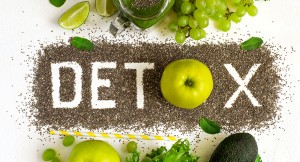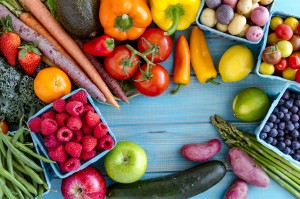
Toxicity is a major problem
Did you know that approximately 10 million tons (over 21 billion pounds) of toxic chemicals are released into our environment by industries each year? Over the course of a lifetime, we will be exposed to thousands of foreign compounds that can enter our bodies through the food we eat, air we breathe and directly through our skin. To make matters worse, many of us have substituted healthy meals with a poor diet that significantly lacks nutritional value to fuel the body’s detoxifying capacity. These factors can contribute to an accumulation of toxins, or toxicity.
Where do Toxins Come From?
Toxins can derive from chemical pollutants, heavy metals, herbicides & pesticides, prescription drug and OTC medications, alcohol, active/ passive cigarette smoking, processed foods, food additives and even personal care, beauty and cleaning products. However, toxins can also come from normal metabolism and intestinal buildup of unhealthy bacteria within your own body.
Symptoms you need to detox
Several symptoms and conditions have been associated with possible toxic exposures and toxicity, including:
- Bloating and fluid retention
- Constipation, diarrhea, irritable bowel syndrome, or reflux
- Congestion, allergies, asthma, sinus issues
- Brain fog
- Depression, anxiety, trouble focusing
- Headaches or Migraines
- Insomnia
- Weight gain or trouble losing weight
- Skin issues—acne, eczema, psoriasis
- Canker sores
- Autoimmune diseases
- Any chronic disease or health condition
- Excess weight around the middle (belly fat)
- Cravings for sugar and refined carbs
- Bingeing on sugar or junk food
- Yo-yo dieting where you keep gaining back the weight
- Fatigue, low energy, or feeling tired and sluggish
- Joint pain or muscle aches
- Mood problems like anxiety, depression or insomnia
- Memory problems
- Low sex drive or function
- Simply put… you “feel like crap”
Detoxification of stored toxins involves 3 stages
Only substances that are easily dissolved in water or water-soluble, can be effectively excreted from the body. Toxic compounds, however, are typically stored as fatty molecules and therefore, do not mix well in water, and are harder to eliminate from the body. The detoxification process transforms these toxic, fat-soluble substances into harmless, water-soluble molecules which can then be excreted out of the body.
Detoxification systems in the body can be summarized in 3 phases:
Liver function Phase 1: Fat- soluble toxins are transformed into intermediate compounds which can be more reactive but bind more easily to non-toxic, water-soluble molecules in Phase II
Liver function Phase 2: Formation between the reactive intermediates and water-soluble molecules make the entire compound harmless and ready for excretion of the body. Without enough supportive Phase II substances, the reactive intermediates can attack healthy tissues and may cause damage
Excretion Phase 3: Neutralized toxins, now made water-soluble, are removed from the body in urine via the kidneys or in bile/feces through the intestines
Reduce your Toxic Exposure
Listed below are some practical suggestions to help lower your exposure to toxins.
To minimize toxins in the diet:
- Avoid food high in inflammatory fat, additives, and preservatives

- “Eat Clean”: a diet rich in whole, real, nutrient dense foods
- Eat organically grown vegetables, fruits, and grains
- Avoid packaged non-GMOs products
- Consume humanely raised animal products that are free of hormones & antibiotics (avoid conventional meats)
- Invest in a quality water filter
- Drink plenty of clean filtered water
To minimize toxins from the environment:
- Use an effective air purification system
- Avoid plastics: water bottles, containers & baggies, etc.
- Wear protective clothing and/or apparatus when working with toxic materials
- Replace furnace and air conditioning filters regularly
- Switch to non-toxic, chemical free cleaning products
- Switch to natural chemical free self-care and beauty products
- Avoid “scented” fragrance sprays, air filters, candles, etc.
Nutritional Support for Detoxification
Studies have shown that the overall detoxification process is heavily nutrient- dependent, where the 3 phases of liver detoxification are fueled by vitamins, minerals, and other major food components.
There are nutrients and natural ways that may help maintain and improve detoxification. Some include:
- Consuming enough clean quality water is essential for detoxing. Aim to drink at least half of your bodyweight in ounces of water per day. Individuals who are active or who struggle with detoxing need more.
- Herbs and plants like dandelion root, burdock, fennel, peppermint, milk thistle, artichoke root
- Vitamins C, Glutathione, NAC, all B Vitamins, Zinc
- Probiotics and Prebiotics to support healthy gut function (optimal digestion, absorption and elimination)
- Chia seeds, flaxseeds, psyllium husk provide fiber, which is needed to move for healthy gut function and proper elimination of waste & toxins
- Cruciferous vegetables: cabbages, broccoli, cauliflower, brussel sprouts, kale, etc. all contain fiber and phytonutrients that are needed for hormone balancing and elimination.
Getting Started
Without optimal detoxification, your body will not efficiently remove harmful toxins. You have read about the effects of toxic exposure and different ways to get started on living a cleaner lifestyle.
It is never too late to take control of your health. Starting with just a few swaps in your diet and lifestyle can help tremendously with reducing your toxic exposure and improving your body’s natural detoxification processes.
Want to learn more about detoxing and how to safely and effectively do a detox program?
Come to our free workshop on Monday March 11th at 6pm at our office in Painesville. This duo-lead workshop will feature Dr. Misty Senz and holistic health speaker Tracy Goldhardt. Together they will be discussing “Spring Cleaning” for your body, home and overall health.
Call our office or send us an email to reserve your seat!
